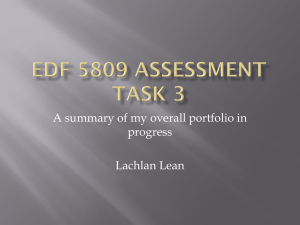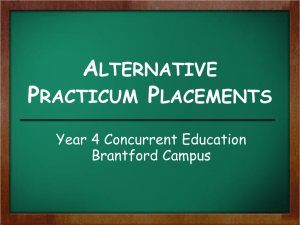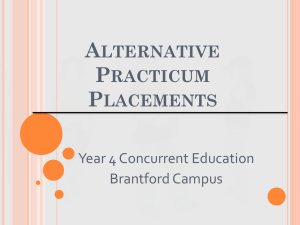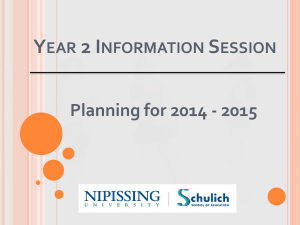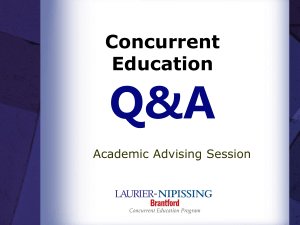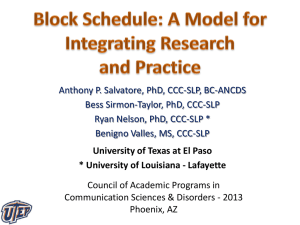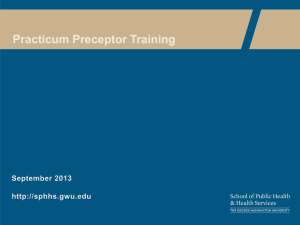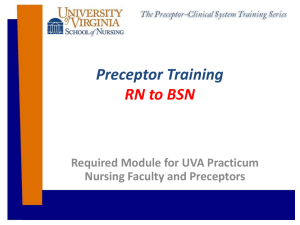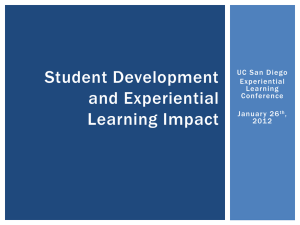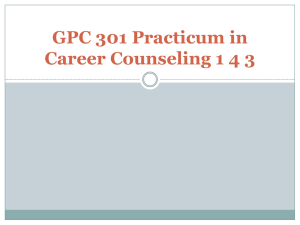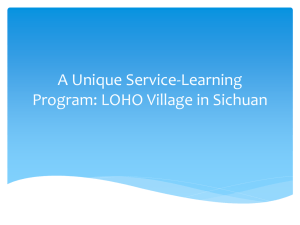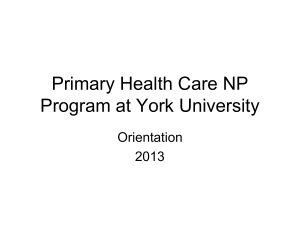MA/SID First Year General Information
advertisement
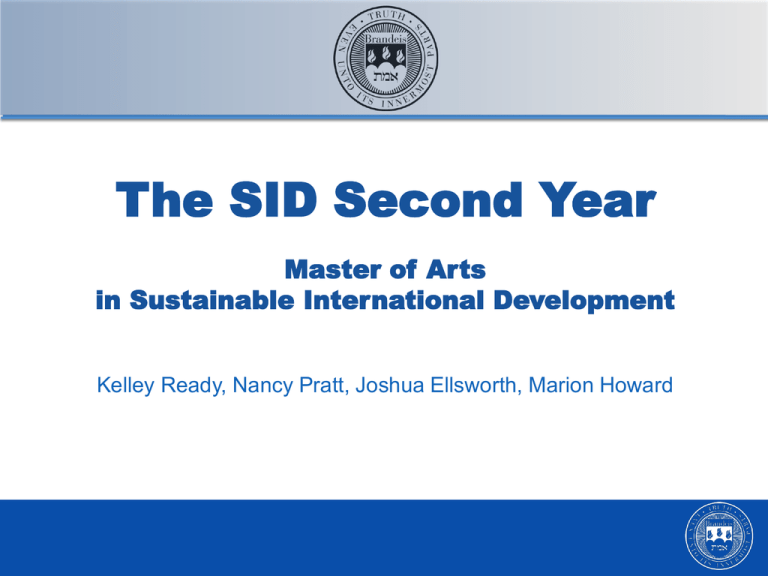
The SID Second Year Master of Arts in Sustainable International Development Kelley Ready, Nancy Pratt, Joshua Ellsworth, Marion Howard Agenda • Options for second year – Specifics – Requirements – Information from recent past experiences – Sources of funding • Support for securing a practicum – Career Development – Practicum Coordinator – Assistant Director Options for the SID Second Year • Practicum • Advanced study • Specialization – Gender and development – Development management – Environmental conservation • Alternative practicum track – – – – China (BNU) Ghana (UDS) India (TERI) Thailand (AIT) SID requirements • All students must have fulfilled all first year in residence requirements to move to the second year • Passing grades in all required classes, a minimum of 16 credits per semester, and no outstanding financial obligations • For Advanced Study – Approved proposal (Summer) • For Specialization – Offer from host organization with Terms of Reference (ToR) – Approved proposal (Summer) • For Practicum/Alternative Practicum – Offer from host organization with Terms of Reference (ToR) – Approved proposal (Summer) Practicum requirements • Professional level position at a host development organization • Full time (equivalent to 35-40 hour work week) • A minimum of six months – From at least September 1 – March 1 • Work under the leadership of a designated Field Supervisor Benefits of doing a practicum • • • • • • • • Put your graduate school learning into practice Gain additional or new experience Learn firsthand about organizational culture Experiential learning about a development problem or issue that matters to you Acquire new contacts May improve language ability Be part of sustainable development initiatives on the ground in a new setting and culture Low tuition costs Practicum challenges •Identifying a practicum you want •Finding a host organization that wants you •Full-time work •Probably have to move for six months •May have to adjust to a new culture and context – Challenge and benefit •Writing your master’s paper on your own time, while working full-time at a host organization What qualifies as a host organization? • Development IGOs, INGOs, multi- & bilaterals, government, private sector, NGOs, CBOs, etc. • Major international organizations’ headquarters in Washington, New York, Geneva, Bangkok, Nairobi, etc. • International and national organizations’ field stations and offices • National and regional development organizations • Grassroots and local development organizations • Private development agencies • Field and applied research institutions Host organization requirements • Must have been in existence for at least two years • Must have an office and space for you to work – Working remotely is not an option • Must provide a designated field supervisor • Must have at least two full-time staff Some of this year’s host organizations • United Nations, mostly UNDP but also UN Women, UNESCO etc. in USA, Panama, Thailand, Turkey, Brazil (10 students) • Oxfam-America (4 students in various programs) • Mercy Corp in Beirut, Lebanon, working with Syrian refugees • Sports & Development-Grassroots Soccer in Tanzania, Shooting Star Basketball Program in Rwanda and Boston • World Resources Institute (2 students) More of this year’s practicum • BRAC in Bangladesh (3 students) • A student from Sierra Leone is in Cambridge with the Human Rights Education Association • A student from India is doing a practicum with the Center for Sustainable International Development • A student from Uganda is working with an NGO in Boston that provides services to mostly Somali immigrants • A student from US is working on the African Storybook Project in Kenya with two SID alumni Advanced study • A second year of coursework in the field of holistic sustainable development • Second year master’s seminars in fall and spring • Time for dedicated literature review and reading • Go deeper into areas of interest • Explore new approaches – – – – Course in other Heller programs Courses in other Brandeis graduate schools (IBS, GSAS) Courses in Consortium Schools Independent study • Contact: Prof. Josh Ellsworth Specialization • A practice-focused specialization in a significant sub-field of sustainable development: development management, gender & development, or environmental conservation • MA/SID degree plus a certificate letter of specialization • 3 month field practicum in fall semester with specialized coursework (16 credits) in spring semester • Option for advanced study students: 3 month summer practicum with specialized coursework (16 credits) in spring semester • Contact: Prof Marion Howard Alternative track practicum • Alternative track practicum combined classroom study at a partner university with associated field research: – – – – Beijing Normal University (BNU), China University of Development Studies (UDS), Ghana Asian Institute of Technology (AIT), Thailand, in Climate Change TERI University, India, in Climate Change • Supervised field research • Exposure to work of local institutes, NGOs, and researchers • Contact: Prof. Joseph Assan Sources of Funding for non-US Citizens • Davis Putter Scholarship Fund – provides need-based grants to students who are actively working for peace and justice • http://www.davisputter.org/ • Education for Sustainable Development Scholarship (ESDS) – students pursuing advanced studies in sustainable energy development – http://www.globalelectricity.org/en/index.jsp?p=79 • AAUW Scholarships – fellowships for women who are not US citizens or permanent residents – http://www.aauw.org/what-we-do/educational-funding-andawards/international-fellowships/ – Deadline to apply December 1, 2014 Fellowships for US Citizens • Peace Corp Response – Must be either a RPCV or have ten years of experience • http://www.peacecorps.gov/volunteer/response/ • Switzer Foundation Fellowship – have strong academic qualifications with academic and career goals focused on environmental improvement. • http://www.switzernetwork.org/become-fellow • Boren Fellowships – An initiative of the National Security Education Program (NSEP) – Provides funding for U.S. graduate students to study less commonly taught languages in world regions critical to U.S. interests – Has a NSEP Service Requirement http://www.borenawards.org/boren_fellowship Sites to Use to Search for Funding • http://heller.brandeis.edu/admissions/financial/externalaid.html • http://www.scholars4dev.com/6499/scholarships-in-usafor-international-students/ • http://www.iefa.org/ • http://www.internationalscholarships.com/ • http://www.oas.org/en/rowefund/FinancialGuideForHighe rEducation.pdf Support for securing a practicum • The Career Development Center (Resumes, letters, interview prep) – Nancy Pratt (international students) – Adam Monteko (domestic students) • Practicum coordinator – Prof. Kelley Ready • SID web page (http://heller.brandeis.edu/sid) – Current Students • MA/SID • First year practicum students • SID Second Year Handbook (new version in spring) • Spring workshops • Faculty and alums Networking & online resources • Online resources • heller.brandeis.edu/careers • hellercareerconnect.com – List of SID host organizations and the students paper titles on the Heller website • LinkedIn • MA/SID First Year General Information • Heller.brandeis.edu/students/academics/ma-sid/first-year/index.html • Network! – Informational interviews – Fellow students, faculty, alumni, prior practicum placement sites, Heller Research Institutes and Centers (Health, Youth, Assets, Global Development, etc.) LinkedIn groups • A major advantage of LinkedIn is the ability to connect with groups of like-minded individuals • Examples include: • Heller School subgroups • Sustainable International Development • Geographic specific groups • Sub-categories of SID – environment, finance, etc. • Moja Link – NGO, nonprofit, & philanthropy jobs Networking and negotiation • All of this Networking will help you with your job search as well… • Brush up on your negotiation skills. For those doing a Practicum, you might have to negotiate the following to include in your Terms of Reference (ToR): – – – – Job description/roles & responsibilities Work schedule Compensation/transportation/housing Supervisory relationship and commitments Other important information • Meet with Career Advisors. We are here during the winter break with phone or Skype appointments available! • Attend career events • Make sure that you have a complete profile with a reviewed (and uploaded) resume in hellercareerconnect.com • Meet with the Practicum Coordinator • Make sure that you have a LinkedIn profile • Get business cards on heller.brandeis.edu/careers • Join the trip to NY and D.C. in January and February and make connections during the trip Timeline for Practicum • Before winter break – Meet with Career Development to create a generic/targeted resume. • During winter break, research opportunities, using Hellercareerconnect.com, LinkedIn, and other resources. • Refer to Career Guide on Networking and Information Interviewing. • If you have not yet met with Kelley Ready, Josh Ellsworth, Joseph Assan or Marion Howard for an initial discussion, please meet with them by February 1. QUESTIONS? Thank you! Keep in mind that in Spring Semester you will: • Receive training to prepare for your second year • Identify a development problem or issue on which to focus and start reading about it • Request your permanent academic advisor • Search dedicatedly for a practicum, if you are doing practicum or specialization in your second year
